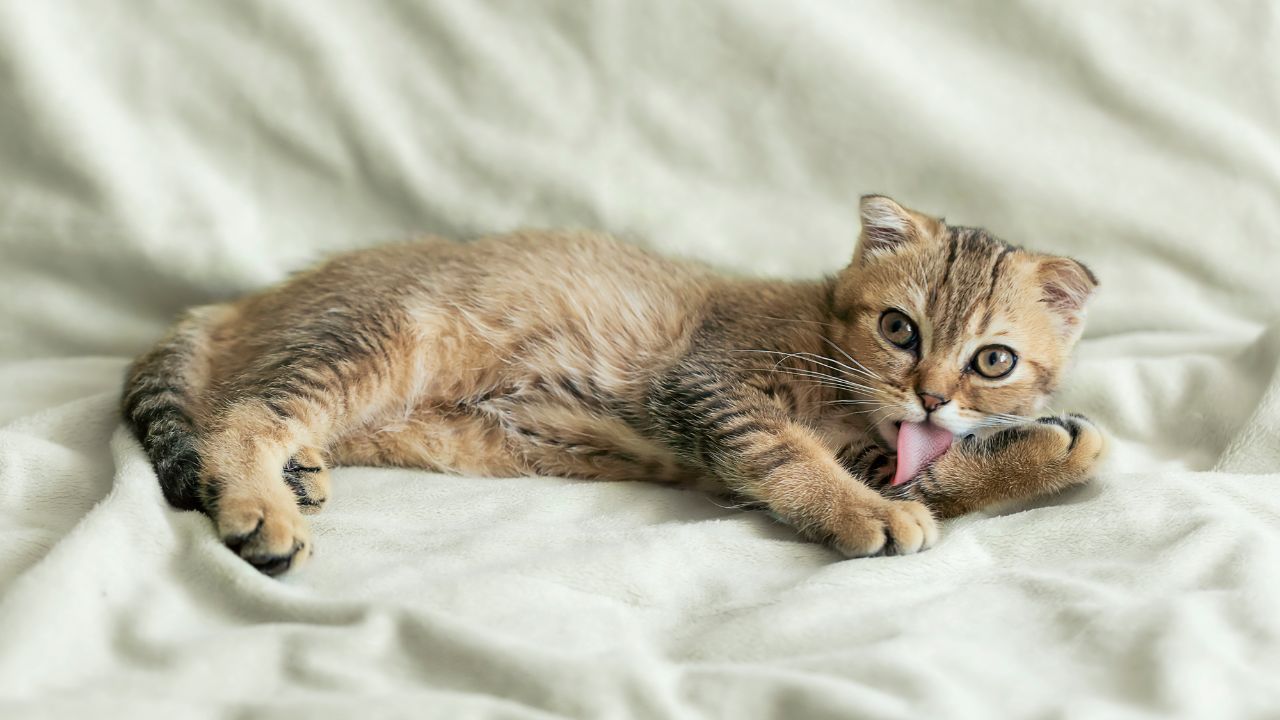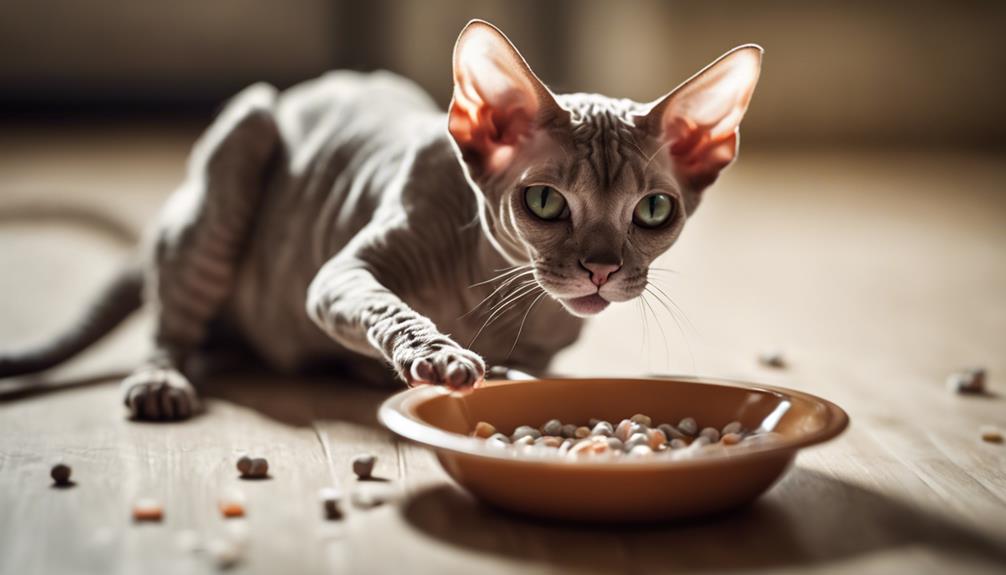Cats come in different shapes and sizes, and their ears are no exception. Some cats have small ears compared to others, and while it might seem like a minor difference, it can actually reveal a lot about the feline’s genetic makeup. In this article, we will explore what it means when a cat has small ears and what factors contribute to this physical characteristic.
Firstly, it’s important to note that not all cats with small ears have the same condition. Some cats have small ears due to a genetic mutation, such as the Scottish Fold breed, which is known for its folded ears. Other cats may have naturally small ears compared to the average cat, which can be attributed to their unique genetic makeup. It’s also worth noting that some cats may have small ears due to a medical condition, such as a congenital defect or an injury.
Understanding what it means when a cat has small ears can help pet owners better care for their feline companions. By knowing the possible causes of this characteristic, they can identify any underlying health issues and provide the necessary care and attention to ensure their cat’s wellbeing. In the following sections, we will delve deeper into the different factors that contribute to small ears in cats and what pet owners can do to ensure their cat’s health and happiness.
What are Small Ears in Cats?
Cats come in all shapes and sizes, and so do their ears. Some cats have large, pointed ears that stand straight up, while others have small, rounded ears that sit close to their head. When a cat has small ears, it means that their ears are noticeably smaller than the average size for their breed.
Small ears in cats can be a genetic trait, which means that certain breeds are more likely to have small ears than others. For example, the Persian, Scottish Fold, American Curl, Exotic Shorthair, Himalayan, and Highlander breeds are known for having small ears. In these breeds, small ears are considered a desirable trait and are often bred for.
However, small ears can also be a result of health issues or malnutrition. If a cat’s ears are smaller than usual and they are also exhibiting other symptoms such as lethargy or weight loss, it’s important to take them to a veterinarian for a check-up.
It’s worth noting that small ears in cats do not necessarily affect their hearing. Cats have a very acute sense of hearing and rely on their ears to detect even the slightest sounds. While small ears may look different, they do not necessarily have any impact on a cat’s ability to hear.
In conclusion, small ears in cats can be a genetic trait or a result of health issues. If you have a cat with small ears, it’s important to ensure that they are healthy and happy, regardless of their ear size.
Causes of Small Ears in Cats
Small ears in cats can be caused by various factors, including genetics, health conditions, and controversial practices like ear tipping. Here are some of the possible causes:
Genetics
Some cat breeds are known for having small ears. For example, the Scottish Fold breed is known for its unique folded ears that make them appear smaller than other cats. This trait is caused by a genetic mutation that affects the cartilage in the ears. Other breeds like the Devon Rex and the Sphynx also have relatively small ears compared to other cats.
Health Conditions
Certain health conditions can also cause small ears in cats. For example, a condition called microtia can cause the ears to be abnormally small or deformed. This condition is caused by a genetic mutation that affects the development of the ear during fetal growth.
Another condition that can cause small ears in cats is chronic ear infections. Frequent infections can lead to scarring and damage to the ear tissue, which can cause the ears to appear smaller than normal.
Controversial Practices
Ear tipping is a controversial practice that involves surgically removing the tip of a cat’s ear. This practice is often done to identify feral or community cats that have been spayed or neutered. While ear tipping does not directly cause small ears, it can make the ears appear smaller due to the missing tip. Ear tipping is a controversial practice, and some animal welfare organizations are against it.
In conclusion, small ears in cats can be caused by various factors, including genetics, health conditions, and controversial practices like ear tipping. If you notice that your cat’s ears are smaller than normal, it is important to consult with a veterinarian to determine the underlying cause and ensure that your cat receives proper treatment.
Symptoms of Small Ears in Cats
Cats with small ears may exhibit a few symptoms that are related to their ear size. Here are some common symptoms:
- Behavioral changes: Cats with small ears may be more sensitive to loud noises and may exhibit signs of fear or anxiety when exposed to loud sounds.
- Hearing issues: Cats with small ears may have difficulty hearing and may not respond to sounds as quickly as cats with normal-sized ears.
- Ear canal problems: Small ears can lead to a narrower ear canal, which can increase the risk of ear infections and wax buildup.
- Mite infestations: Cats with small ears may be more prone to ear mite infestations, which can lead to itching, head shaking, and discharge from the ears.
- Kitten development: Kittens with small ears may have delayed ear development, which can affect their hearing and balance.
- Pinna abnormalities: Small ears can also lead to abnormalities in the pinna (the external part of the ear), which can affect the cat’s ability to rotate their ears and locate the source of sounds.
- Middle and inner ear issues: Small ears can also affect the middle and inner ear, leading to hearing loss and balance problems.
- Parasitic infections: Small ears can also increase the risk of parasitic infections, such as ear mites, which can cause itching, redness, and discharge from the ears.
If you notice any of these symptoms in your cat, it is important to take them to a veterinarian for a proper diagnosis and treatment. Ear infections and mite infestations can be painful and uncomfortable for cats, and can lead to more serious health problems if left untreated. Your vet can recommend the best course of treatment based on your cat’s individual needs and medical history.

Diagnosis of Small Ears in Cats
Diagnosing small ears in cats can be challenging, as there are several reasons why a cat may have smaller ears than usual. If you are concerned about your cat’s ear size, it is best to consult with a veterinarian who can help determine the underlying cause. Here are some factors that may contribute to small ears in cats:
Symptoms
Small ears in cats may be accompanied by other symptoms that can help identify the underlying cause. These symptoms may include:
- Deafness
- Degeneration of the ear muscles
- Irritation of the ear canal
- Ear mites
- Discharge or inflammation of the tympanic membrane
- Breathing difficulties due to a narrow Eustachian tube
Veterinary Examination
During a veterinary examination, the vet will inspect your cat’s ears for any signs of inflammation, discharge, or irritation. They may also use an otoscope to examine the inside of the ear canal and check for any abnormalities in the ear structure. If necessary, the vet may also perform hearing tests to assess your cat’s hearing ability.
Cat Breeds
Certain cat breeds, such as Scottish Folds, American Curls, Exotic Shorthairs, and Himalayans, are more prone to having smaller ears due to genetic factors. However, it is important to note that not all cats of these breeds will have small ears, and not all cats with small ears belong to these breeds.
In conclusion, diagnosing small ears in cats requires a thorough veterinary examination and assessment of other symptoms. While some cat breeds are more prone to having smaller ears, there may be other underlying factors that contribute to this condition. If you are concerned about your cat’s ear size, it is best to consult with a veterinarian who can provide a proper diagnosis and treatment plan.
Treatment for Small Ears in Cats
Small ears in cats can be a result of genetics or medical conditions. While there is no direct treatment for small ears, there are certain measures that can be taken to ensure the cat’s overall health and well-being.
Regular Visits to the Veterinarian
Regular visits to the veterinarian are essential to ensure that the cat is healthy and free from any medical conditions that can cause small ears. The veterinarian can diagnose any underlying medical conditions and provide appropriate treatment.
Grooming
Regular grooming can help prevent ear infections, which can cause small ears. It is important to clean the cat’s ears regularly to prevent the buildup of earwax, dirt, and debris. It is recommended to use a pet-safe ear cleaner and cotton balls to clean the cat’s ears.
Ear Mites
Ear mites are common in cats and can cause irritation and inflammation of the ear canal. This can lead to small ears in cats. Treatment for ear mites involves the use of prescription medications that are applied directly to the ear.
Cat Breeds
Certain cat breeds, such as Scottish Fold, American Curl, Exotic Shorthair, Himalayan, and Highlander, are more prone to small ears due to their genetics. While there is no direct treatment for small ears in these breeds, regular visits to the veterinarian and grooming can help prevent any underlying medical conditions that can cause small ears.
Ear Wax and Discharge
Excessive ear wax and discharge can cause small ears in cats. It is important to clean the cat’s ears regularly to prevent the buildup of earwax and to check for any signs of discharge. If there is a foul odor or hearing loss, it is recommended to visit the veterinarian for further diagnosis and treatment.
Allergies
Allergies, including food allergies and environmental allergies, can cause small ears in cats. Treatment for allergies involves identifying the allergen and avoiding it. The veterinarian may also prescribe medication to manage the symptoms of allergies.
Yeast Infections
Yeast infections can cause small ears in cats. Treatment for yeast infections involves prescription medication that is applied directly to the ear.
Wounds and Foreign Bodies
Wounds and foreign bodies in the ear can cause small ears in cats. Treatment involves removing the foreign body or treating the wound and preventing infection.
In conclusion, while there is no direct treatment for small ears in cats, regular visits to the veterinarian, grooming, and identifying and treating any underlying medical conditions can help prevent small ears. It is important to keep the cat’s ears clean and to seek veterinary care if there are any signs of ear wax, discharge, foul odor, or hearing loss.
Conclusion
In conclusion, small ears in cats can be caused by a variety of factors, including genetics, breed, and health issues. While small ears may not necessarily indicate a problem, it is important to monitor your cat’s ears for any signs of discharge, foul odor, or hearing loss.
Cats rely heavily on their ears for communication, hunting, and self-cleaning. It is important to keep their ears clean and free of waxy debris, which can lead to infections and other health issues. Persian cats, in particular, may require extra attention to their ears due to their long hair and folded ears.
If you notice any signs of ear discharge, foul odor, or hearing loss, it is important to take your cat to the vet for a check-up. These symptoms can indicate allergies, food allergies, yeast infections, wounds, foreign bodies, and other health issues that require prompt attention.
Overall, being aware of your cat’s ear health and taking preventative measures can help ensure they remain healthy and happy for years to come.




